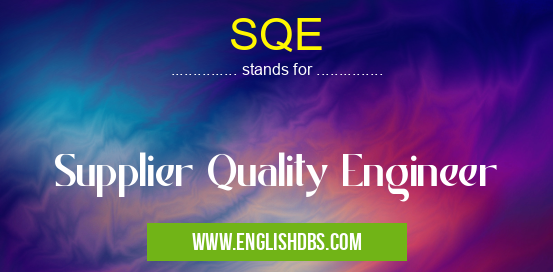What does SQE mean in OCCUPATION & POSITIONS
The term SQE stands for Supplier Quality Engineer. This is a professional with specific training and expertise in the quality assurance of goods and services sourced from external or third-party suppliers. An SQE will often be responsible for ensuring that the products and services being purchased comply with certain specification standards, and are of uniform quality.

SQE meaning in Occupation & Positions in Business
SQE mostly used in an acronym Occupation & Positions in Category Business that means Supplier Quality Engineer
Shorthand: SQE,
Full Form: Supplier Quality Engineer
For more information of "Supplier Quality Engineer", see the section below.
Responsibilities of an SQE
An SQE must have strong technical knowhow about all facets of product development, from design to manufacturing processes. They must conduct detailed inspections on raw materials utilizing sampling techniques to assess whether they meet industry or customer requirements. Additionally, the SQE will oversee assembly processes to ensure proper adherence to tolerance levels, check out discrepancies in tooling designs that may affect product performance or durability, identify ineffective production methods that result in defects, and review non-conforming products or services before they can be used. Moreover, good communication skills are needed when dealing with suppliers so that any issues can be quickly addressed before any irreparable damage is done which could lead to costly delays in delivery times or poor-quality deliveries.
Essential Questions and Answers on Supplier Quality Engineer in "BUSINESS»POSITIONS"
What is a Supplier Quality Engineer?
A Supplier Quality Engineer (SQE) is responsible for ensuring the quality of parts that suppliers create, making sure they meet the design and performance requirements necessary for production use. The SQE regularly evaluates suppliers and their products to maintain and improve their processes and operational performance.
What are the main duties of an SQE?
An SQE is primarily tasked with evaluating supplier products, carrying out inspections, maintaining records of quality control activities, providing feedback to suppliers, taking corrective actions when necessary and issuing certificates of compliance. They may also be involved in auditing activities, customer visits, participating in root cause analysis and preparing reports as required.
What qualifications or experience do I need to become an SQE?
To become an SQE you will need at least a bachelor’s degree in engineering or related field, as well as experience with quality management systems such as ISO 9001. Knowledge and experience using statistical analysis tools such as Six Sigma is also beneficial.
How does an SQE ensure quality?
An SQE uses various methods to ensure quality depending on the specific project or product requirement. These can include visual inspection, dimensional measurements, materials testing/ sampling and other analytical tests. They are also involved in negotiating terms with suppliers to make sure all components adhere to regulations set by the company or client.
How often should an SQE conduct supplier audits?
This varies according to individual circumstances but it’s usually recommended that audits are carried out based on risk assessment - i.e if particular parts pose a potential risk then these should be audited more frequently than others which have less critical requirements.
What type of information should an SQE gather during supplier visits?
During supplier visits it’s important for the SQE to gather technical information about components to help identify areas for improvement and assist in implementation of corrective actions if necessary; this could include drawings, specifications, process flow details etc.. Other information could relate to resource utilisation levels such as staff training records or equipment maintenance statistics which can affect overall product quality performance.
Who typically works alongside an SQE?
An SQE may work closely with a range of people from within both their organisation and those from external suppliers including purchasing managers/ buyers, production engineers working on component designs/ set-ups,quality assurance departments conducting product inspections etc..
How does an SQE handle issues relating to failure rates or non-conformances?
When dealing with issues relating to poor quality output an SQE would usually review available data (reports/ statistical evidence) before liaising with both internal & external stakeholders so that corrective action plans can be implemented immediately where required - this could entail ceasing buying activities until appropriate improvements have been made by the relevant supplier(s).
Final Words:
Supplier Quality Engineers are essential players within the supply chain process whose expertise has become increasingly important due to the complexities involved in sourcing high-quality components at low cost points throughout global markets. By covering all aspects of supplier qualification from ensuring compliance with specifications through inspecting products delivered by vendors, these professionals serve both a preventative role in minimizing QA rejects while providing an invaluable resource for improving overall operational efficiency across the entire supply chain network.
